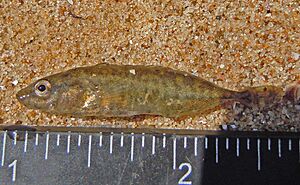Ukrainian stickleback facts for kids
The Ukrainian stickleback (Pungitius platygaster) is a small fish also known by other names like the Caspian ninespine stickleback. It belongs to a group of fish called sticklebacks. You can find this fish in many countries, including Afghanistan, Bulgaria, Iran, Kazakhstan, Moldova, Romania, Russia, Serbia, Montenegro, and Ukraine. It lives in big water areas like the Black Sea, Sea of Azov, Aral Sea, and Caspian Sea.
Quick facts for kids Ukrainian stickleback |
|
|---|---|
 |
|
| Ukrainian stickleback from the Dniester Estuary, Ukraine | |
| Conservation status | |
| Scientific classification |
|
| Kingdom: | Animalia |
| Phylum: | Chordata |
| Class: | Actinopterygii |
| Order: | Gasterosteiformes |
| Family: | Gasterosteidae |
| Genus: | Pungitius |
| Species: |
P. platygaster
|
| Binomial name | |
| Pungitius platygaster (Kessler, 1859)
|
|
| Script error: The function "autoWithCaption" does not exist. | |
| Synonyms | |
|
|
Script error: No such module "Check for conflicting parameters".
Contents
What Does the Ukrainian Stickleback Look Like?
This fish has some special features that help identify it. It does not have a ridge or "keel" on its tail section. It also has large bony plates, called scutes, on its sides.
Body Features
The Ukrainian stickleback usually has a darker body color. Its bones are strong and well-formed. The bones in its head and around its fins are also quite detailed.
Fins and Spines
It has a pair of pelvic fins, each with one strong spine and a small soft ray. The dorsal fin, which is on its back, has 8 to 11 sharp spines. These spines point a bit to the left and right. The last spine is a little longer than the others. It also has soft rays in its dorsal and anal fins.
Other Characteristics
This fish has 9 to 11 gill rakers, which help it filter food from the water. It has 29 to 32 bony scutes, with 7 to 12 of these being large ones on its sides. The fish usually has 29 to 31 vertebrae, which are the bones that make up its backbone. Its tail fin is flat at the end.
Sources
- Keivany, Y. 1996. Taxonomic revision of the genus Pungitius with emphasis on P. hellenicus. MSc thesis. Department of Biological Sciences, University of Alberta. Edmonton. 98 pp.
- Keivany, Y., and J.S. Nelson. 2000. Taxonomic review of the genus Pungitius, ninespine sticklebacks (Teleostei, Gasterosteidae). Cybium, 24(2): 107–122.
- Keivany, Y. and J.S. Nelson. 2004. Phylogenetic relationships of sticklebacks (Gasterosteidae), with emphasis on ninespine sticklebacks (Pungitius spp.). Behaviour, 141(11/12): 1485–1497.
 | Bessie Coleman |
 | Spann Watson |
 | Jill E. Brown |
 | Sherman W. White |


